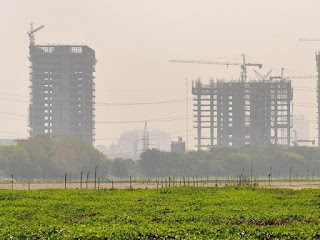Land Pooling Policy- A New Hope to own Homes in Delhi
Amaravati, the new capital of Andhra Pradesh, is being constructed by innovative land-pooling mechanism without the use of the Land Acquisition Act. Impressed by Andhra Pradesh chief minister N. Chandrababu Naidu's land pooling scheme for building his dream capital Amravati, the Pune officials are mulling over making it the base of the rehabilitation package for farmers losing plots in Purandar - the proposed international airport site.
Those
who held land on June 2, 2014 and sold it to the government to carve out the
new capital will benefit from the tax waiver. Over 20,000 farmers have given up
land under the Land Pooling Policy (LPP) for the development of the new capital
city. The exemptions are retrospective and are applicable for transfer of
capital assets, both land and buildings.
So shouldn’t Delhi be given the same priority? After notification,
the land-pooling policy of Delhi was currently languishing due to lack of
political will, thereby leading to an increase in slums and unauthorized developments.
It has been almost after 2 years it has paved the way for it..
Why Land Pooling Policy is the Solution???
- Farmers, whether in Amravati or Delhi, deserve the same
exemption. This is because Delhi is India’s only city state, which is 100%,
urbanized according to the Master Plan of Delhi 2021 or MPD 2021. The
stated vision is to “develop Delhi into a world-class mega polis. Land is either
an inherited or long-term investment asset, and so valuation is largely
subjective. There is also a projected need for almost 1.6 million
affordable residential units and 130 million sq ft of work space.
Governments,
both at the Center and the state level, need to understand that the average per
capita land holding in Delhi would be less than half a hectare, and the only
way to aggregate 56,000 hectares will be through the incentives route. This
would help channelize billions in institutional investments into land and
future developments.
2.
Risk & Rewards
under Land Pooling Policy… The average price
in neighboring Dwarka is between Rs 8,500- 9500 per sq ft. While projects in
the L-Zone are somewhere between 3000-4500 per sq ft only. Since this is being
developed on much planned manner people staying here can enjoy the facilities of
Smart Cities. Airport and Metro are well connected to this area. While early buyers in
the region could possibly benefit, they should scrutinize the project in which
they intend to invest and check all the relevant documents. Moreover, the area
will take at least four to five years to be ready for habitation. Consequently,
buyers should take a decision, only after considering their requirements.
3.
What makes L Zone (A Product of Land Pooling)
unique Option- L Zone is the first product of Land Pooling Policy Delhi. Now
the question is why anyone should look for product in L zone. As per as my understanding and reading
various documentary. This zone is going to be a super world class city. If I
can list out few unique features of this is below. A) DDA has decided density
of 250-300 persons per hectares. So you can imagine the green beauty. B) There
are three high security existing development likes- BSP Camp in Chawla, CRPF
Camp in Jharoda Kalana and Air Force Base in Dhansa. C) Out of 22979 hectares
there will be residential development in 5344 hectares only. D) There will be
two major forest reserve in this area one in Mitraon and another in Jainpur. E)
There are existing Industrial area in Tikri Kalan and Whole Sale food grain
market in Najafgarh. F) For the better provision of Water there will be water reservoir
in 900 acres. There are many reasons to invest in L Zone. We should contact the
author for better understanding.
So, Land
pooling is the only way forward, and now is the best time to establish Delhi as
the political, economic and development capital of India.


Comments
Post a Comment